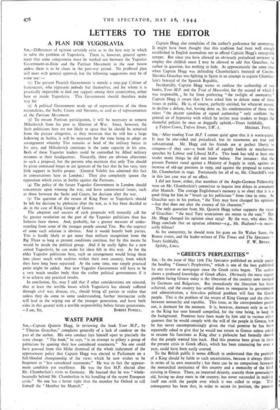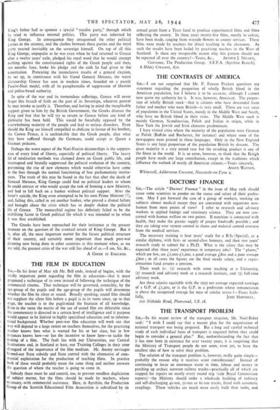" GREECE'S PERPLEXITIES "
•
SIR,—In the issue of May I zth The Spectator published an article under the heading " Greece's Perplexities," which is one of the best published by any review or newspaper since the Greek crisis began. The author shows a profound knowledge, of Greek affairs. Obviously the most urgent problem facing Greece today is the liberation of the country now ravaged by Germans and Bulgarians. But immediately the liberation has been achieved, and the country has settled down to reorganise its government and administration, a first-class political problem will face the Greek people. This is the problem of the return of King George and the choice between monarchy and republic. This issue, as the correspondent points out, is dormant for the moment. It is, however, dormant only in so far as the King has seen himself compelled, for the time being, to keep in the background. Promises have been made by him and in various other quarters that he would comply with the will of the people in Greece, but he has never uncompromisingly given the vital promise he has been repeatedly asked to give that he would not return to Greece unless asked to resume his functions as King after a plebiscite had formally show n that the people wanted him back. Had this promise been given in time the present crisis in Greek affairs, which has been simmering for over a year, could have been easily averted.
To the British public it seems difficult to understand that the position of a King should be liable to such uncertainties, because it always thinks in terms of its own monarchy ; but there can be no comparison between the monarchial institution of this country and a monarchy of the kind existing in Greece. There, an imported dynasty, scarcely three generatiors old, having no deep roots in the country, has never succeeded in makir g itself one .with the people over which it was called to reign. 'Re consequence has been that, in order to secure its position, the present King's father had to sponsor a special "royalist party," through which he tried to influence internal politics. This party was inherited by King George. In consequence they antagonised the other political parties-in the country, and the clashes between these parties and the royal party reacted inevitably on the sovereign himself. On top of all this King George, unpopular as he was even when he had returned to Greece after a twelve years' exile, pledged his royal word that he would attempt nothing against the constitutional rights of the Greek people and then, ten months later, broke his pledge and the oath he had given to the constitution. Pretexting the inconclusive results of a general election, he set up, in connivance with his friend General Metaxas, the worst dictatorship Greece has seen in modern times, founded on a purely Fascist-Nazi model, with all its paraphernalia of suppression of liberties and police-based authority.
In spite of the war and its tremendous sufferings, Greece will never forget this breach of faith on the part of its Sovereign, whatever pretext he may invoke to justify it. Therefore, and having in mind the inexplicable support given to him by the British Government, the Greeks distrust the King and fear that he will try to return to Greece before any kind of plebiscite has been held. This would be forcefully opposed by the overwhelming majority of the people and lead to serious disorders. Even should the King see himself compelled to abdicate in favour of his brother, the Crown Prince, it is unthinkable that the Greek people, after what they have suffered through the Germans, could accept as Queen a German princess.
Perhaps the worst aspect of the Nazi-Fascist dictatorships is the suppres- sion of every kind of liberty, especially of political liberty. The heavy lid of totalitarian methods was clamped down on Greek public life, and interrupted and brutally suppressed the political evolution of the country, preventing the rise of new elements which would otherwise have come to the fore through the normal functioning of free parliamentary institu- tions. The truth of this may be found in the fact that after the death of General Metaxas, King George• could find no political leaders to whom he could entrust or who would accept the task of forming a new Ministry, and had to fall back on a banker without political support. After the latter's suicide, the King even attempted to be his own Prime Minister (!), and, failing this, called in yet another banker, who proved a dismal failure and brought about the crisis which has so deeply shaken the political life of Greece. The monarchial regime has definitely failed to be the stabilising factor in Greek political life which it was intended to be when it was first established.
The Greeks have been reproached for their insistence at the present moment on the question of the eventual return of King George: But it is, after all, the most important matter for the future political structure of their country, and certainly more important than much post-war planning now being done in other countries at this moment when, as we are told, the greatest crisis of the war still lies ahead of us.—I am, Sr, &c., A GREEK IN ENGLAND.



























 Previous page
Previous page